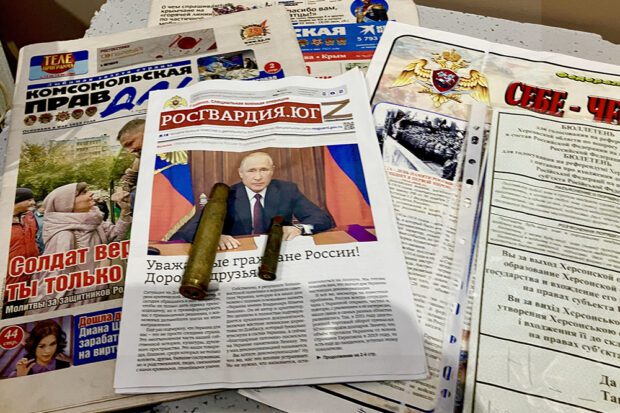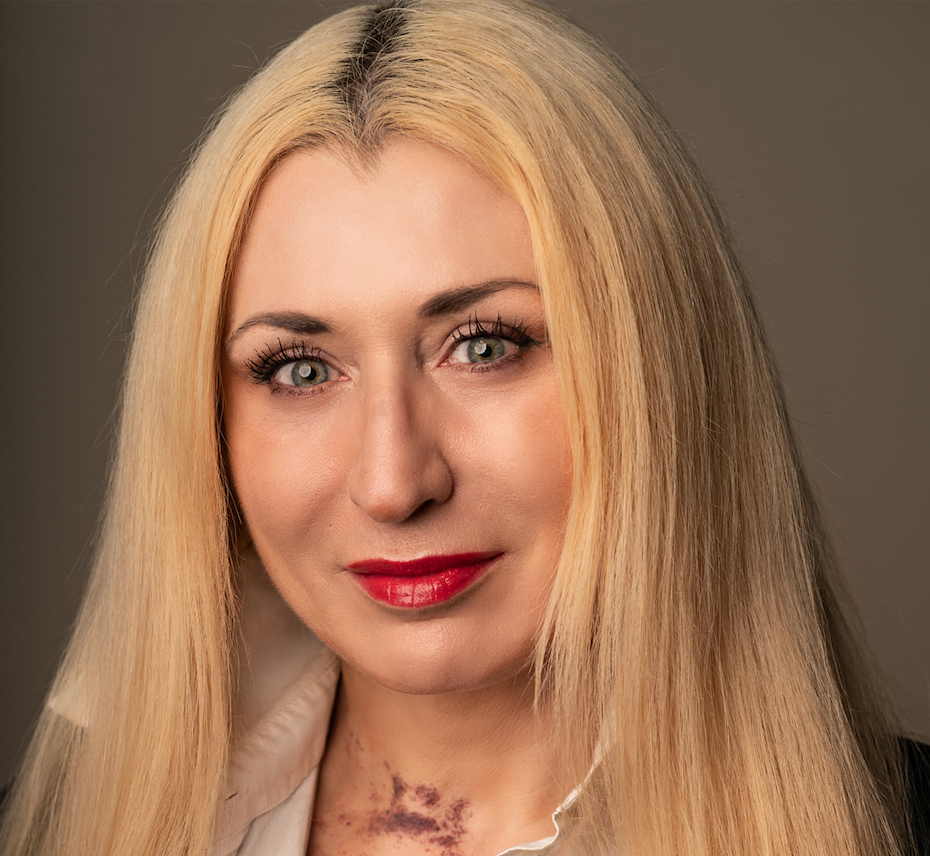
As Russia wages hybrid war against Ukraine and the wider democratic world, information manipulation remains one of its most powerful weapons. The Kremlin deploys propaganda to confuse international audiences, justify its aggression and undermine global support for Ukraine.
These narratives, designed by state-controlled media and amplified by paid trolls and unwitting Western commentators, so-called useful idiots, distort reality with alarming effectiveness.
To resist the information warfare campaign, it is essential to understand how disinformation functions. It does not just spread false facts. Its goal is to erode trust, weaken alliances, sow discord and dismantle the foundations of democratic debate.
The main munitions are narratives—and the Kremlin has built a vast arsenal, with each narrative serving a strategic purpose in Russia’s broader war. Deconstructing these talking points is important not to just set the record straight and protect Ukraine: It is critical to do so to defend democratic societies from authoritarian influence.
The “Defensive War” Myth
The Kremlin continues to present its invasion of Ukraine as a defensive action, claiming it was forced to intervene to protect Russian-speaking populations, particularly in eastern Ukraine. In reality, Russia’s war against Ukraine began in 2014, not 2022, when the full-scale invasion started.
The annexation of Crimea and the covert military campaign in Donbas marked the opening chapter of a long-term imperial project. The full-scale invasion in February 2022 was not a response to any threat but a calculated continuation of this strategy to destroy Ukraine’s independence.
The notion that Russian speakers were in danger has been debunked repeatedly. Civilian casualties in Donbas were falling before 2022, according to UN data. The International Court of Justice found no evidence of ethnic persecution.
On the contrary, Russian military operations killed thousands of Russian speakers in Donbas and Luhansk prior to the full-scale invasion in 2022 and thousands of Russian-speaking civilians in cities like Kharkiv, Mariupol and Kherson since February 2022.
Forced deportations, filtration camps and the abduction of Ukrainian children, “human safari”—documented by international investigators—point to a deliberate policy of ethnic erasure, not protection.
Rewriting NATO’s Role
Another persistent Kremlin talking point blames NATO for provoking the war. This narrative implies that Western expansionism pushed Russia into conflict. In fact, NATO is a defensive alliance with no history of threatening Russia.
Since the end of the Cold War, former Soviet republics and Warsaw Pact nations joined NATO not out of aggression but rather out of a desire for security from Moscow.
Ukraine was not a NATO member when Russia invaded, nor was its membership imminent. Claims about broken promises to halt NATO’s expansion are historically inaccurate. Even the last general secretary of the Communist Party of the Soviet Union, Mikhail Gorbachev, confirmed no such commitments were made.
The narrative of the NATO threat serves to disguise Moscow’s real motive: preventing its neighbors from aligning with democratic institutions and escaping its orbit.
The Budapest Memorandum: Broken Promises
In 1994, Ukraine surrendered the world’s third-largest nuclear arsenal in exchange for security assurances under the Budapest Memorandum. The Russian Federation, along with the United States and the United Kingdom, pledged to respect Ukraine’s sovereignty and territorial integrity. By violating this agreement in 2014 and again in 2022, Russia undermined the entire global nonproliferation regime.
The failure to enforce the memorandum raises urgent questions for other states considering disarmament: What are international guarantees worth if they can be ignored without consequence?
Weaponizing History: The “Denazification” Lie
To justify its invasion, the Kremlin claimed Ukraine is ruled by Nazis and must be “cleansed.” Ukraine’s far-right groups have limited public support and no representation in parliament.
In Ukraine’s 2019 parliamentary elections, a united front of radical right-wing parties received only 2.15% of the vote—well below the 5% threshold required to enter parliament. President Volodymyr Zelenskyy is Jewish and lost family members in the Holocaust.
In contrast, Russian state ideology increasingly embraces ultranationalist and imperial themes. The Nazi label is not only a lie—it is a deliberate psychological weapon designed to invoke historical trauma, stir domestic support and rationalize war crimes against civilians.
Elections in Wartime
Russia has accused Ukraine of authoritarianism for suspending national elections during the war. But under Ukraine’s constitution, elections cannot be held during martial law. With active combat zones, mass displacement and constant drone and missile strikes, free and fair elections would be impossible.
Polling stations would be targeted, candidates could not safely campaign and millions of citizens under occupation or in exile would be disenfranchised. Postponing elections is not a power grab; it is a legal and necessary measure to preserve the democratic process in the long term.
The 2014 Revolution Was Not a Coup
Another staple of Russian propaganda is the portrayal of Ukraine’s 2014 Revolution of Dignity as a U.S.-engineered coup. This revisionist history ignores the reality of mass, grassroots protests against corruption and authoritarianism.
The uprising was triggered by President Viktor Yanukovych’s decision to abandon an EU association agreement in favor of deeper ties with Moscow. After his security forces opened fire on protesters, Yanukovych fled to Russia. Subsequent elections—observed and validated by international bodies—brought new, democratically elected leaders to power. There is no credible evidence of foreign orchestration.
Language and Cultural Sovereignty
The Kremlin also falsely claims Ukraine banned the Russian language. Russian remains widely spoken across the country. What changed after 2014 was the implementation of laws to promote the Ukrainian language in public institutions, media and education—a common practice in post-colonial states asserting cultural identity after decades of forced assimilation.
No laws prevent citizens from speaking Russian in private or in daily life. The policy is about restoring balance, not silencing minorities.
The Church, Politics and National Security
Russian officials accuse Ukraine of banning Orthodox Christianity. In fact, Ukraine only restricted the activities of the Ukrainian Orthodox Church under the Moscow Patriarchate, which was found to have direct ties to Russian intelligence.
Some clergy were caught passing information to the Russian military or spreading wartime propaganda. Orthodox Christians in Ukraine are free to practice their religion. The independent Orthodox Church of Ukraine remains active. The actions taken were against espionage, not against faith.
Political Parties and Collaboration
Ukraine has also been accused of banning opposition parties. What actually happened is that parties with documented ties to the Russian state, such as the Opposition Platform–For Life, were suspended during wartime. Many of their leaders fled to Russia or occupied territories.
Ukraine’s parliament remains pluralistic, with a spectrum of political views. Wartime restrictions targeted collaborators and agents of foreign influence, not legitimate dissent.
Media and Information Warfare
Similar accusations are made about media freedom. Ukraine did shut down several pro-Russian television channels, particularly those linked to Viktor Medvedchuk, a close ally of Vladimir Putin.
These channels were found to coordinate with Russian intelligence and disseminate disinformation during active hostilities. Independent media remain operational throughout Ukraine.
Foreign journalists (including the author of this article), local outlets and critical voices continue to report freely. Wartime media controls are defensive measures against psychological warfare, not censorship of dissent.
Illegal Referendums and the Myth of “Self-Determination”
Russia’s claims that Crimea and parts of Donbas “voted” to join Russia are not recognized by any credible international institution. These referendums were held under military occupation, without independent observers, and in blatant violation of Ukrainian and international law.
Even Russia’s own constitution does not permit regions to unilaterally secede. At the same time, Moscow violently suppresses any attempt at autonomy within its own borders, whether in Chechnya or Tatarstan. Its professed support for self-determination is selective and entirely opportunistic.
Disarming Fake Narratives: A Weapon against Authoritarianism
Russia’s disinformation campaigns are central to its strategy. Carefully constructed narratives are used to justify war, excuse atrocities and weaken the international response. They are also designed to exhaust, confuse and divide audiences across the globe.
Fighting these narratives requires developing critical thinking skills, education and active resistance. The war in Ukraine is a test of whether reality can stand in the face of authoritarian power disinformation campaigns. If the global community fails to intercept and fight the Kremlin narratives, democracy is at risk worldwide.

